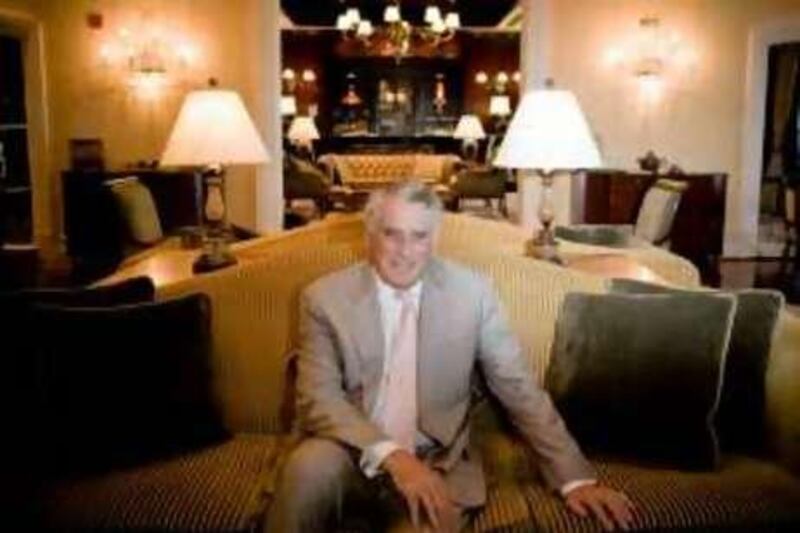For a hotel chain that has built its reputation as a luxury brand, staff selection is essential. Simon Cooper, the president and chief operating officer of Ritz-Carlton Hotels and Resorts, says it took six interviews to secure his appointment in 2001. "It was a long process," he recalls. "But everyone working at the hotel - from the housecleaning staff to senior managers - had to go through it. It's the cost of working at the Ritz-Carlton."
The international chain's staff are entrusted with preserving the high-end luxury standards set by its founder, Cesar Ritz. The chain opened its first US property in Boston in 1927. From hardwood floors to crystal chandeliers in its lounge, the Ritz-Carlton Dubai in Jumeirah aspires to replicate that air of classy sophistication in a region more familiar with glitter and dazzle. Its fame and history notwithstanding, the Ritz-Carlton's management decided a few years ago that the brand needed a little less starch in its collar.
Changes were made to suit the tastes of younger guests who seek a less formal setting for their holidays and meetings. "About five years ago, we decided to shift our style from traditional to casual elegance, because we knew that the business could not be sustainable otherwise," says Mr Cooper. "But till this day, we have hotels that have lobbies that are just too grand to walk around in your shorts, while in some of our other properties you would feel comfortable doing that."
For most of the chain's history, that would have been unthinkable. When the Ritz-Carlton opened in Boston, it was regarded as a social club for the aristocracy, where the wealthy and powerful mingled. Until the 1960s, the hotel went so far as to examine the quality of the writing paper on which guests wrote to the hotel requesting reservations. If it was not of high enough quality, they were refused.
Mr Cooper compares the recent evolution of Ritz-Carlton to how the French designer, Louis Vuitton, mixed traditional with contemporary in his signature handbag designs. "Louis Vuitton still manufactures the traditional beige on brown bag, but he also has one with a graffiti design, and they both sell equally well. It's the same in our business; many people still like the traditional, while the younger generations prefer the contemporary."
Asked which style he favours, Mr Cooper smiles. "I prefer the casual elegance, because when I'm on vacation I don't shave and I like having a relaxed setting. But my wife is not like that. She's really Mrs Ritz. When I get home after a long week, all I simply want is cheese and a glass of wine; she wants to go to all the places I've been during the work week." Lately, Mr Cooper has been spending more time in the Middle East, where the Ritz-Carlton operates five hotels and is eyeing expansion. In June next year, it will add a sixth hotel. To be modelled on a contemporary style, the hotel will be located in the Dubai International Financial Centre (DIFC). It has also signed contracts to manage two new hotels in Abu Dhabi and one in Riyadh. .
The expansion plan could be challenged by the global economic crisis, which has forced other hotel chains to scale back operations, but Mr Cooper is looking beyond the immediate situation. "Your timing is never going to be perfect when deciding to develop a hotel," he says. "We had a hotel open in Bahrain just two months before Iraq got invaded and I was asked at the time if this was a good idea. I said the hotel is going to be around for 50 years, so we are looking at the long term."
But he concedes that the current economic situation is sending ripples through the luxury hotel business. "Even for people with old money, at a time like this there is a certain reluctance to be lavish in one's expenditure," he says. The Ritz-Carlton's US holdings have already felt the repercussions. "It's tough," Mr Cooper admits. "October was a very poor month for our US hotels and it's not over yet."
The chain's hotels in the Middle East have so far been immune, recording their best results during the same period. "There is no doubt that the Middle East will be impacted... but to what extent we still don't know." The Ritz-Carlton is owned by Marriott International, the world's largest hotel company. Last month, the Marriot said third-quarter profit fell 7.1 per cent on a drop in earnings from its timeshare division, Bloomberg reported.
Net income declined to US$131 million (Dh481m) from $141m a year earlier, the company said. Revenue increased 12 per cent to $3.04 billion. North American revenue per available room, a measure of rates and occupancy known as revpar, increased 7.2 per cent, exceeding Marriott's target of 6 per cent to 7 per cent. The company expects revpar growth of 7 per cent to 8 per cent in the fourth quarter. In an effort to counter dropping occupancy levels in the US, the Ritz-Carlton has introduced value-added packages to encourage guests to stay longer, a move Mr Cooper describes as more "efficient" than slashing room rates.
He regrets, however, that management was forced to lay off a number of US-based staff, although he declines to reveal how many. "We try to keep as many ladies and gentlemen employed as possible and make sure that they work a minimum of 30 hours so they don't lose their benefits," he says. Yet knowing that the impact of the economic crisis is cyclical, Mr Cooper is confident that the good times will once again return.
Edward Wyner, the Boston real estate developer who built the chain's first hotel, also had high hopes. During the Great Depression, Wyner kept the lights on in vacant hotel rooms to portray an aura of success. abakr@thenational.ae






